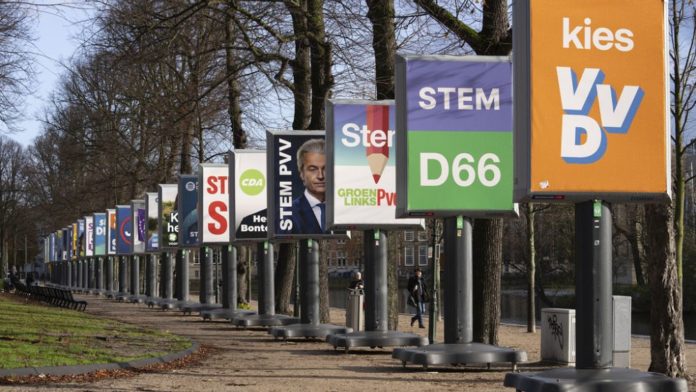“Anyone who knows who will win this election is lying,” said political scientist Julia Wouters. “Anything and everything can still happen.”
Voting began in the Netherlands on Wednesday in what is tipped to be a tight election.
Four parties have emerged as front-runners as Prime Minister Mark Rutte is replaced after a record thirteen years at the helm.
Opinion polls suggest centre-right leader Dilan Yesilgöz could win, becoming the country’s first female leader.
“It’s time,” she told AFP on the sidelines of a rally.
But a few days before the election polling suggests the far-right could have made an unexpected breakthrough.
Yesilgöz’s closest rivals are the anti-Islam populist Geert Wilders – now one of the favourites – and an alliance of the left and greens headed by ex-EU commissioner Frans Timmerman.
Timmerman is considered a decisive voice on environmental issues after defending the EU Green Deal.
Polling stations opened at 7:30 a.m. local time and will close at 9 p.m.
The elections will be watched closely across Europe, with the Netherlands playing a leading role on a number of issues, such as the Eurozone bailout and the Ukraine war.
The election could lead to a far-right coalition
More than 13 million voters have a choice of 26 parties, and as many as 17 could win seats.
Front-runner Yesilgöz was born in Turkey and arrived in the Netherlands at the age of eight with her father, an asylum-seeker. However, she makes no secret of her desire to reduce immigration.
She previously raised eyebrows by suggesting a possible coalition with Geert Wilders’ far-right PVV.
Wilders has recently tried to smooth out his image by qualifying some of his most controversial positions. He recently said there more pressing problems than reducing the number of asylum-seekers and has muted some of his anti-Islam views.
A victory for the man with peroxide hair would be a political earthquake – felt beyond the Netherlands’ borders. Forming a government would also be complicated, with possible partners uncertain.
Trust in the government is at a low following a scandal where thousands of parents were wrongly labelled as benefit cheats.
Appearing in August, the New Social Contract (NSC) led by charismatic whistleblower Pieter Omtzigt, is likely to be central to forming a new government, after the party surged rapidly in the polls.
The 49-year-old polyglot promises to make Dutch politics trustworthy and also takes a tough stance on immigration.
The popular politician says he does not want to be leader, but whoever wins will likely need his support.
What issues have shaped the Dutch election?
Immigration, the cost of living and the housing crisis – which particularly affects young Dutch voters – have been the main issues in the campaign.
After the long leadership of Rutte – nicknamed “Teflon” Mark for his ability to overcome scandals – the Dutch are looking for a change in the way of governing, according to experts.
Rutte shocked the country in July by announcing his government had collapsed after “insurmountable” differences on immigration. A few days later he announced he would leave politics – another stir.
No party is predicted to win more than 20% of the vote, meaning lengthy discussions will be needed to form a coalition.
It took 271 days for the last government to be formed, a record.
“Anyone who knows who will win this election is lying,” political scientist Julia Wouters told AFP. “Anything and everything can still happen.”


